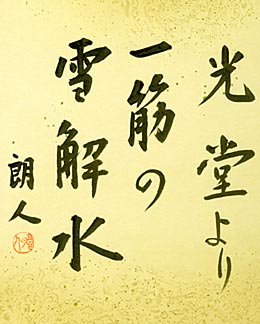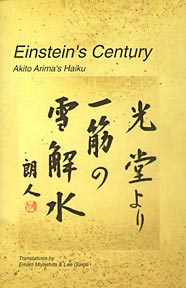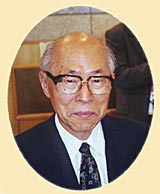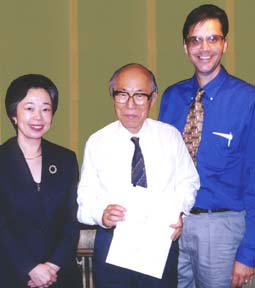Einstein's Century: Akito Arima's Haikutranslated by Emiko Miyashita & Lee Gurga |
|
| Akito Arima. Einstein's Century: Akito Arima's
Haiku © July, 2001. Perfect Bound, (5.5" X 8.5")
128 pages. ISBN: 1-929820-01-1
out of print "Dr Akito Arima combines a certain traditional elegance, and the seasoned perspective of a world traveled professor and scientist. He maintains the depth and lightness of true haiku, yet fluently covers places and spaces, and as a family person at that. I love his spider webs, women's gloves, and use of the color white. (To mention just a little.) His poems subtly pose a powerful model for us all, with their delicate, confident cosmopolitanism:
I warmly welcome this fine collection into the world of American poetry." Gary Snyder |
|
|
"Dr. Arima excels in writing haiku that are clear, clean, and true. Their simplicity and directness mimic those of Bashô. The words in Arima's poems fall trippingly from the tongue, and ring with a variety of resonances reflecting many environments and moods. Even a novice reader of haiku will find riches here, and those who know something of the depth of either the tradition of Japanese literature will also find rich rewards for time spent with these poems. For example, in one of his recent haiku collection we have the following, in Miyashita and Gurga's fine translation:
The chill of that winter light resembles the chill in Rilke's poem
"Knight" ("Ritter"), with its lines "When
will the sword spring / over the iron-hedge, that foreign, freeing
blade?" But instead of the chill of a death-wish fantasy, we
have here the metal itself, the light gleaming on chain mail and breastplates.
Even not knowing its own name, the kitten knows what it wants: companionship, physical warmth, perhaps some food. Who among us was different in our crib? "As a leading haiku master, Arima-sensei deeply understands his tradition, his language, and his craft. Emiko Miyashita, a leading member of Ten'i herself, and Lee Gurga, one of America's leading haiku poets and critics, have worked very hard to reflect these in this fine collection. I congratulate them, and highly recommend this unique opportunity to view the heart of a truly great contemporary Japanese haiku poet to all readers of English." Some of Arima's poems, of course, depend on a knowledge of Japanese culture for full appreciation. For example, over 500 years after it was built, the seventeenth century poet Bashô visited the famous Hall of Light (Hikaridô) at Chûsonji Temple in Hiraizumi, in present day Iwate Prefecture. This was the northernmost point that Bashô reached on the Pacific side of Honshu during his journey of 1689, and is still considered an outlying district. Housing the remains of three important leaders of the region, this splendid hall features walls lined with gold leaf and pillars decorated with mother-of-pearl. |
|
|
By Bashô's day, efforts had been made to protect and preserve the historic structure, as he tells in his travel diary, Narrow Roads of the Interior (Oku no hosomichi). He goes on to write this verse:
Now, almost 900 years after its construction, Arima-sensei visits that same place and writes:
Through the shifting seasons, this thread connects us today with all that remains, all that went before. Ferocious warrior-lords, itinerant poet, professor of nuclear physics: all share in the continuing rhythms of life and the twists and turns of history. This haiku is featured on the front cover shikishi. —William J. Higginson |
 |
At the peak of a long and distinguished career, Dr. Akito Arima served education as president of the University of Tokyo (1989-1993), science as president of Japan's Institute of Physical and Chemical Research (1993-1998), and his nation as Minister of Education, Science, Sports, and Culture (1998-2000). Scientists at Los Alamos National Laboratory here in New Mexico held a symposium and published a collection of scholarly essays in honor of Dr. Arima's contributions to our understanding of atomic structure. A member of the House of Councillors, Japan's equivalent to the U. S. Senate, Dr. Arima continues to serve both science and Japan's rising international consciousness by bringing the knowledge gained in his years of scientific and poetic work to bear on the problems of the new century. While Dr. Arima was pursuing his dual career as a world-class nuclear physicist and internationally recognized educational administrator, he also became an outstanding leader among Japan's haiku poets and a great supporter of haiku worldwide. His haiku mentor was Seison Yamaguchi (18921988), one of the important disciples of Kyoshi Takahama who helped carry the tradition of haiku into the modern world. Seison's dual life as professor of engineering and haiku master may have provided a role model for the younger poet-scientist. His haiku collection Ten'i ("Providence") received the Haiku Poets Association Prize for 1987. In 1990 he started a group under the same name, Ten'i , which in less than a decade became one of Japan's most prominent haiku clubs. In 1995, Dr. Arima was instrumental in sending a delegation of contemporary Japanese haiku poets led by master Yatsuka Ishihara to the first joint conference of Japan's Haiku International Association and the Haiku Society of America, held in Chicago. He played a leading role in organizing the second conference in Tokyo in 1997. One outgrowth of these conferences has been the collaboration between translators Lee Gurga and Emiko Miyashita that resulted in the publication last year of the collection Love Haiku: Masajo Suzuki's Lifetime of Love; that collaboration continues in this book. Dr. Arima is at once a great intellect and a deeply human, humble, person. He is also a fine poet. —William J. Higginson, from the introduction |
|
Emiko Miyashita was born in Fukushima (Happy Island) city in Japan on September 6, 1954. The city is surrounded by the mountains that change their expressions delicately, according to seasons and the time of the day. She now owns a studio on this mountainside. It was her father's oil painting studio where he planted many young trees in its garden with Emiko. Currently she lives with her family in Kawasaki city. She also lived in Urbana, Illinois, U.S.A. (1959-61) and in Accra, Ghana (1969-71) where she was exposed to English language and its culture. She graduated from Doshisha University in Kyoto in 1978. Emiko joined Ten'i (Providence) haiku group led by Dr. Akito Arima in 1993 and became its dojin (leading member) in 1999. Lee Gurga and she have been working together as a translating team since 1997. They have published Love Haiku: Masajo Suzuki's Lifetime of Love in 2000 from Brooks Books. She is writing a series featuring English haiku in HAIKUKAI (Haiku World) magazine, published monthly in Japan. She is a member of International Haiku Association (Japan) and Haiku Society of America. Lee Gurga was born and raised in Chicago, Illinois. He is a past president of the Haiku Society of America and is currently associate editor of the journal Modern Haiku and the haiku selector for the Illinois Times newspaper. His haiku have won the top prize in haiku contests in the United States, Canada, and Japan. His books In and Out of Fog and Fresh Scent were both awarded the first prize in the Haiku Society of America Merit Book Awards. He was awarded an Illinois Arts Council Poetry Fellowship in 1998 for his work in haiku. He lives with his family in rural Lincoln, Illinois and Key West, Florida. "The 170 haiku in Einstein's Century were selected from Dr. Arima's five haiku books: Bokoku (1972), Chimei (1982), Ten-i (1987), Jijun (1993), and Risshi (1999). Some more recent haiku, translated from haiku periodicals, have also been included. His wife Hiroko and mother Kazuko ("Dojin") are also well-known haiku poets in Japan. The haiku are arranged in reverse chronological order, beginning with the most recent, published in early 2001. We felt that in this way, you could get to know Dr. Arima as you would make a new acquaintance: by first experiencing him in the present, and then over time gaining a deeper insight into the total person. These poems, while written in Japanese, the traditional language of haiku, have an international flavor that reflects the international status of haiku today. There are poems here written in Italy, China, Israel, Egypt, Brazil, Norway, and the United States as well as Japan. The poems reflect the internationalization of human culture as experienced by one man. But this one man is many men: scientist, philosopher, poet, statesman. His haiku are a reflection of our general human condition, communicated to us in the paradoxical haiku way: the general through the particular, the whole of contemporary human experience through the presentation of a single significant image." —Lee Gurga & Emiko Miyashita |
|
Other sources of Akito Arima's haiku include:Risshi, Tokyo, Kadokawa Shoten, 1999 Gendai Haiku Kanshô Zenshû, Tokyo, Tokyo Shiki Shuppan,1998 Shunyôdô Haiku Bunko Arima Akito, Tokyo, Shunyôdô Shoten,1993 Jijun, Tokyo, Kadokawa Shoten, 1993 Ten'i, Tokyo, Fujimi Shobô, 1987 Jichû Gendai Haiku Series: Arima Akito, Tokyo, Haijin Kyôkai,1984 Chimei, Tokyo, Bokuyôsha,1982 Bokoku, Tokyo, Kasuga Shobô,1972 |
|
|
"This bilingual collection of Dr. Arima's haiku is truly a gift to the international haiku community! A simplicity, a sensitivity to whatever world he is inhabiting, and, often, a wry sense of humor, make these haiku a delight to read, a delight to savor in the deft translations of Lee Gurga and Emiko Myashita." Elizabeth Searle Lamb |
"Akito, freely conceiving, grasps things liberally; he warms them with human empathy." Tohta Kaneko |

 About the Author: Dr. Akito Arima
About the Author: Dr. Akito Arima
 About the Translators:
About the Translators: